TV Review: The Alienist
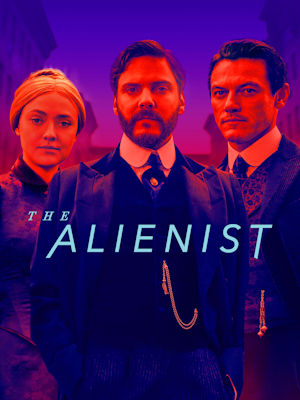 | | TNT's The Alienist |
The city of New York was a brutal place in 1896, a well-oiled engine that churned on poverty, corruption, privilege, and vice. However, with the arrival of a vicious serial killer, a psychologist with dangerous ideas about how to catch him, and a new police commissioner determined to set a new course for the future, that engine is threatened. This is the setting for The Alienist, the TNT limited series based on the ground-breaking novel of the same name by Caleb Carr. Part crime procedural, part dark historical drama, the series bills itself as a major television event, and impressively, it lives up to the hype.
The most impressive thing about it is the setting, which is so lovingly crafted and detailed that you'd swear the film crew had access to a time machine in order to film on location. The series drops you into 1896 New York City and never breaks the spell with winks, obvious errors, or anachronisms. It looks and feels exactly as it should, which is a testament to the set designs, the costumes, the make-up, the army of researchers that must have been toiling away in the background, the sound designers, and especially the visual effects crews. This is a level of historical filmmaking that is rare for big budget movies, much less a ten-episode television series.
On the other hand, the tone is so dour and serious in The Alienist's world that you don't want to spend much time there. Whereas the novel offset the darkness of its themes through jovial friendships and a sense of adventure, the television series nixes a lot of that in favor of more pensive, distressed characters and a more meditative mood. This is readily apparent, for example, in the very different characterization of Theodore Roosevelt, a whirlwind of boyish excitement in the novel but a stone serious stickler in the series. Roosevelt, as played by Brian Geraghty (who looks the part, but doesn't have much to work with in the script) is reluctant to help assemble the team of prototypical profilers in the series--despite his enthusiasm for the task in the novel--and he spends almost every scene he's in frowning at everyone in disapproval and annoyance.
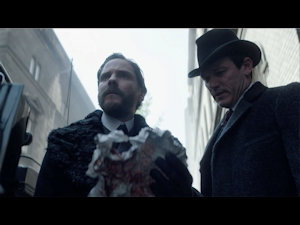 | | Brühl and Evans are at the top of their game |
The polar change in Roosevelt's character is perhaps my biggest gripe about the series, but there are several other changes that are far more rewarding. Most of Carr's characters are given more depth in the series, especially the three leads and the secondary antagonist of Captain Connor, and though the character interactions are more stunted and wooden in the series than they are in the book, the characters nonetheless feel more real.
A lot of this is down to the acting. Daniel Brühl steals the show as the titular alienist, Lazlo Kreizler, delivering a layered performance of a deeply flawed character who is trying his best to overcome as many psychological obstacles as institutional ones. He's not the most likable character by any means, but he is the most interesting. Next is Luke Evan's John Moore, the illustrator and longtime friend of Kreizler who is the closest thing the series has to a protagonist. Moore is as flawed as Kreizler, but is able to hide his flaws behind a rehearsed charm and sarcastic wit. Evans does a good job bringing the character to life, though he relies a bit too much on exasperated sighs and incredulous stares. Douglas Smith and Matthew Sheer as the detective sargeant Isaacson brothers are always entertaining on screen--offering the only rays of sunshine and humor in an otherwise sullen show--and David Wilmot is deliciously evil as Captain Connor, the vile and corrupt police captain you love to hate. Also worthy of note are Robert Wisdom as Kreizler's friend and servant Cyrus, Q'orianka Kilcher as the mute Mary, and an absolutely inspired Michael Ironside as famous tycoon J.P. Morgan.
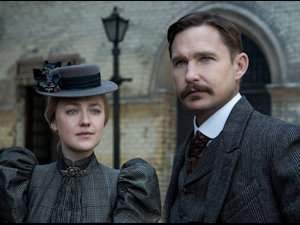 | | Fanning and Geraghty are weak links |
The one actor who fails, unfortunately, is the usually reliable Dakota Fanning. Though she has an impressively delivered monologue near the end of the series, she plays the female lead, Sara Howard, as a meek deer in headlights for practically the entire run. Her character has fire, but Fanning rarely shows it, even when she's proactively looking into Kreizler's history, standing up to the patriarchy of Nineteenth Century America, or taking charge of the murder investigation. Her chemistry with the main love interest, Moore, is all wrong, too. I'm not sure what's gone wrong here, but Fanning's performance feels lazy and uninspired, turning what should be a fascinating character into a blasé young woman who doesn't even try to stand out in the crowd. This one is all on Fanning, too, as the writing for the character is far better than the delivery.
While the characters are given a more lovingly realized backstory and motivation throughout, the plot itself relies far less on psychology than it should, eschewing most of the novel's psychological dives into the serial killer's mind for a lot of meandering side plots and misdirects that have little, if anything, to do with the main story. Most of the psychological profiling is done in the last two episodes rather than spread out over the course of the series, and this is problematic for any number of reasons, not the least of which is that it severely downplays the importance of Kreizler's underlying ideas until a point in the plot where they are no longer coming from Kreizler himself. The series never lets you get a feel for the killer's identity the way the novel does, and a lot of details about him and the importance of certain clues are left underexplained if not discarded entirely.
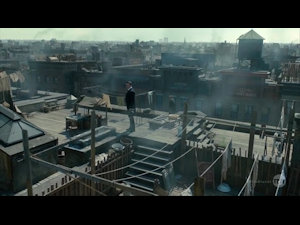 | | Turn of the Century New York really comes to life |
Still, the series does a better job setting up the action in several places, most notably around the climax, which is far superior in the series than it is in the novel. Also, there are certain plot beats in the novel that make more sense in the series, such as the motivations of Captain Connor and the obstruction of the church. The series also spends more time considering Kreizler's religious skepticism and the limits thereof, refusing to shy away from the friction between faith and science that the novel only scratches the surface of.
Ultimately, TNT's The Alienist is a surprisingly well-done adaptation of the exceptional novel. Even for those who have never read Carr's work, it's also a fascinating look at New York City in the late Nineteenth Century as well as an interesting exploration of the beginnings of criminal profiling. It's at times a bit slow and joyless and not all the character interactions work, but the filmmaking and acting are impressive enough to hold it together leading into the last third, where the show simply explodes in the best possible way.
FINAL SCORE:





A remarkable recreation of 1896 New York City and the birth of forensic psychology, TNT's The Alienist is a character-driven thriller that can be a bit slow and dour, but it's a faithful adaptation with a strong ending.
|
-e. magill 3/29/2018
| MORE LIKE THIS: |
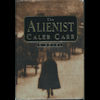
|
The Alienist - Book Review
The Geek prepares for the upcoming TNT limited series with a review of one of his all-time favorite novels. [1/18/2018]
|
|
|
|
|